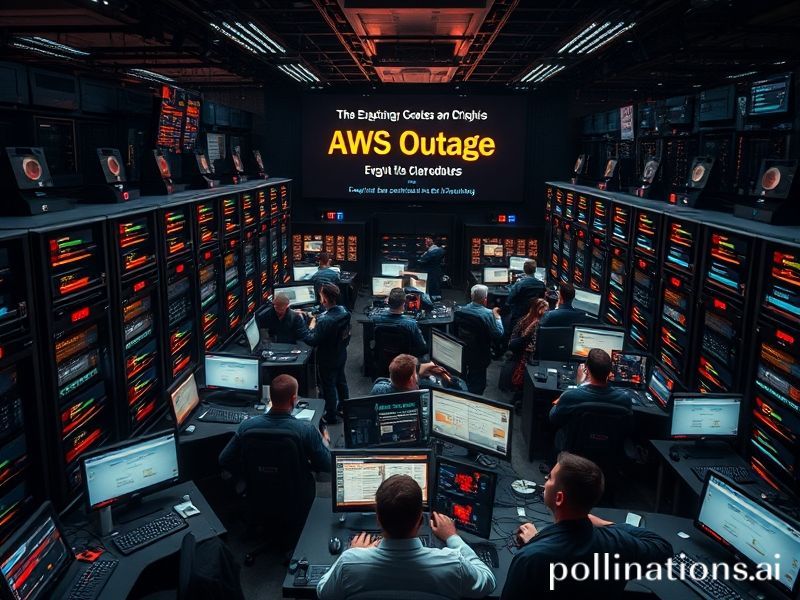When AWS Coughs, the Internet Catches a Cold: The Global Impact of the Recent Outage
**Title: When AWS Coughs, the Internet Catches a Cold: The Global Impact of the Recent Outage**
Alright, folks, buckle up! We’re diving headfirst into the digital drama that had the internet holding its breath for hours. Yes, we’re talking about the Amazon Web Services (AWS) outage that sent shockwaves across the globe. If you were online during this digital blackout, you might have noticed that the internet was acting stranger than a cat in a bathtub. But why did this happen, and why should you care? Let’s break it down.
**The Plot Thickens: What Happened?**
On a seemingly ordinary day, AWS, the cloud computing behemoth that powers a significant chunk of the internet, decided to take an unexpected nap. The outage, which started on a Tuesday morning, left users scratching their heads and businesses scrambling to stay afloat. Websites slowed to a crawl, apps crashed, and even good old Alexa was left speechless. The culprit? A software update gone rogue.
AWS quickly identified the issue and worked tirelessly to restore services. But in the meantime, the internet was left in a state of chaos. It was like trying to navigate a city where all the traffic lights had suddenly gone dark. Chaos, confusion, and a whole lot of memes ensued.
**Why Is This Trending Globally?**
In today’s interconnected world, a hiccup in one corner can send ripples across the globe. AWS is the backbone of countless businesses, from streaming services to social media platforms. When AWS sneezes, the internet catches a cold. This outage affected everything from Disney+ to Slack, making it impossible for users to stream their favorite shows or collaborate on projects. It was a digital domino effect that had everyone talking.
But beyond the immediate inconvenience, this outage highlighted our collective dependence on a few key players in the tech world. It’s a stark reminder that the internet, as vast and decentralized as it seems, is still vulnerable to single points of failure. And in an era where remote work and digital communication are more important than ever, that’s a big deal.
**Cultural Context: The Internet’s Fragile Ecosystem**
The AWS outage also sparked a cultural conversation about the fragility of our digital ecosystem. We’ve grown accustomed to the convenience and reliability of the internet, but incidents like this serve as a wake-up call. They remind us that the internet is not infallible and that our reliance on a few major players comes with risks.
This outage also brought to light the often-invisible infrastructure that powers our daily lives. AWS, like other cloud providers, operates behind the scenes, making it easy to take their services for granted. But when something goes wrong, we’re suddenly confronted with the reality of how much we depend on these services.
**Social Impact: More Than Just a Glitch**
The social impact of the AWS outage was far-reaching. Businesses large and small were affected, leading to lost productivity and revenue. For remote workers, it was a day of frustration and missed deadlines. For streamers and gamers, it was a day of boredom and disappointment. And for parents trying to keep their kids entertained, it was a day of sheer panic.
But beyond the immediate inconvenience, this outage also highlighted the importance of digital resilience. It’s a reminder that we need to have backup plans in place, whether it’s for our businesses, our work, or our entertainment. In a world where the internet is a lifeline, we can’t afford to be left high and dry when things go wrong.
**Why This Topic Is Significant**
The AWS outage is significant for a number of reasons. First, it’s a reminder of the power and influence of a few key players in the tech world. Second, it highlights the fragility of our digital ecosystem and the need for resilience. And finally, it’s a wake-up call about our collective dependence on the internet and the need to have backup plans in place.
In the end, the AWS outage was more than just a glitch. It was a cultural moment that sparked important conversations and highlighted the need for change. And as we move forward, it’s a lesson we can’t afford to forget.
So, the next time AWS coughs, let’s hope we’re better prepared to handle the fallout. Because in today’s digital world, a little prevention can go a long way.







